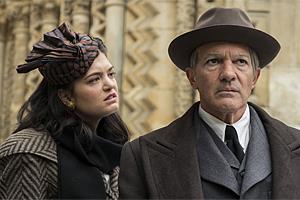
Vincent Van Gogh got a movie and Kirk Douglas an Oscar nomination for playing him in Lust For Life.
The same goes for Jackson Pollock and Ed Harris in Pollock. Charlton Heston didn’t get any Oscar recognition for playing Michelangelo in The Agony and the Ecstasy. But Heston was still big at the box office in 1965, so there’s that.
On the small screen, Joan Allen earned an Emmy nomination for her portrayal of the title character in Lifetime’s Georgia O’Keeffe.
You see where we’re going? Arguably the most famous painter of them all, Pablo Picasso, had been given the brush-off until the National Geographic channel finally came along with Genius: Picasso (Tuesday at 9 p.m. ET), follow-up to its Genius: Einstein and precursor to the newly announced Genius treatment of Frankenstein creator Mary Shelley.
Nat Geo and principal executive producers Ron Howard and Brian Grazer again have landed a name actor to front the second Genius while inviting Samantha Colley back to play one of the protagonist’s discarded women. Antonio Banderas portrays the older Picasso after Geoffrey Rush got an Emmy nod, but not a win, as Albert Einstein in his later years.
Both productions constantly bounce back and forth between their younger/older title characters. This time it’s Alex Rich as a youthful Picasso beset by unscrupulous art dealers, a naysaying father, and a close, but ill-fated friendship with the deeply troubled Carlos Casagemas (Robert Sheehan). It’s again a 10-episode trek, with Nat Geo this time making the first four hours available for review compared to just two for the Einstein bio.
Genius: Picasso is sluggish in the early going before gaining traction in later episodes. Banderas makes a growingly strong impression as a willful and, by now, successful Picasso who proclaims in Episode 4, “Artists must be free. No restrictions of any kind.”

This also applies to the women he collects and discards, most notably the photographer/artist Dora Maar (Colley, with Banderas, right). It’s a terrific performance on her part, full of both fire and sadness at what’s befallen her in the company of a man for whom fidelity can be a passing fancy.
The other women in the older Picasso’s life are the first mother of his children, Marie-Therese Walter (Poppy Delevingne), and a new, young conquest, artist Francoise Gilot (Clemence Poesy). Younger Picasso, yet to be so cavalier with women, initially pledges allegiance to Fernande Olivier (Aisling Franciosi), whom he rescues from destitution and an abusive sculptor.
The production, at times, can be almost ridiculously chaste in its depiction of sexuality, even to the point of an opening disclaimer for Episode 4 that warns, “This program features works of art that may depict nudity.”
As with Genius: Einstein, global disruptions prompt some painful choices; with Picasso in a dilemma after his longtime poet friend, Max Jacob (T.R. Knight), is arrested by Nazis.
The lives and times of both Einstein and Picasso are not as easy to dramatize, as say, a renowned general rallying his troops or a boxer taking another turn in the ring. Watching Picasso paint can only go so far. Howard and Grazer compensate by also bringing his women to vivid life. They both serve his needs and rise up to reproach him when their own needs aren’t met. But Picasso invariably sees matters differently, as he did with his paintings. “You start as lovers,” he philosophizes in Episode 3. ”And if you are not careful, you become victims of your own passion.”
Genius: Picasso, with its notable performances by both Banderas and Colley, has a chance to become much more than a paint-by-the-numbers bio as its story proceeds. A shocking scene at the close of Episode 4 serves to further whet interest in the six hours yet to come. We’re still only in the mid 1940s at this point, and Picasso isn’t even bald yet on the road to a life span of 91 years. He has plenty of time yet to paint and sculpt his way to further greatness while also inflicting himself upon others as only he could.